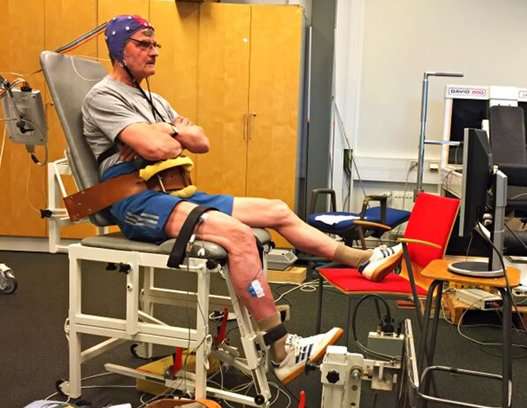Changes in older people's central nervous system lead to compromised ability to sense movement

The central nervous system of older individuals responds to movement and initiates muscular contraction differently compared to young individuals. This is the result of a study led by researcher Simon Walker at the University of Jyväskylä with Postdoctoral Researcher funding from the Academy of Finland. Walker's team also found links between the ability to sense movement and balance control.
The team performed a series of studies, testing healthy young (aged 35 and under) and older (aged 65‒75) individuals who did not regularly exercise. The results revealed changes in the functioning of the older individuals' central nervous system.
In the first study, the researchers rotated the test subjects' both feet independently, up and down, with a specially built device and recorded brain signals using magnetoencephalography. They then analysed the results with a technique known as coherence, comparing the amount of similarity between two signals, in this case the frequency of brain signals and the frequency of the foot movement. They found stronger coherence levels in the older participants. The coherence level was related to the amount of body sway during quiet standing.
"We interpret these findings to mean that those who require greater brain processing of movement have a compromised ability to sense movement. Therefore, they are not as efficient in controlling movement or standing," Walker explains.
In a separate study, Walker's team investigated coherence between two thigh muscles during a voluntary contraction. Here, the older individuals showed lower coherence at several frequencies. According to Walker, this possibly means that older people cannot control their leg muscles as well as young people.
Exercise was used to try to improve the functioning of the central nervous system. However, 14 weeks of resistance training did not change the level of coherence between the muscles of the older individuals during the contractions. "We don't know yet if this is because this type of intervention doesn't enhance central nervous system function, if the duration of the intervention wasn't long enough, if the changes in the central nervous system of older people aren't redeemable, or if it's some combination of all these things," Walker says.
Both of these results occurred in apparently healthy older individuals. These people had a high physical function and good balance control. Nevertheless, they displayed a compromised central nervous system function.
"Hence, there are probably other mechanisms that need to be enhanced to maintain the level of function. Also, it's apparent that when older people need to produce force voluntarily, the electrical signals that control such movement are different compared to young people. Therefore, ageing modifies not only the sensing of movement but also the execution of movement. We need to continue to design interventions and tests to determine whether these changes are reversible," Walker says.
More information: Harri Piitulainen et al. Cortical Proprioceptive Processing Is Altered by Aging, Frontiers in Aging Neuroscience (2018). DOI: 10.3389/fnagi.2018.00147


















